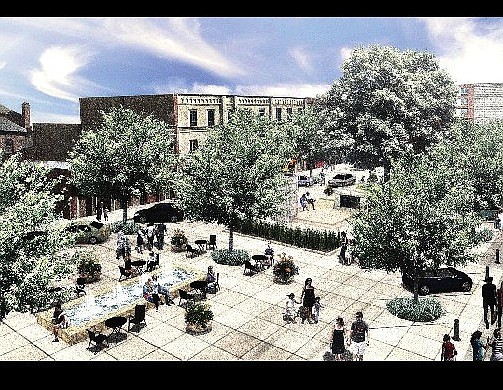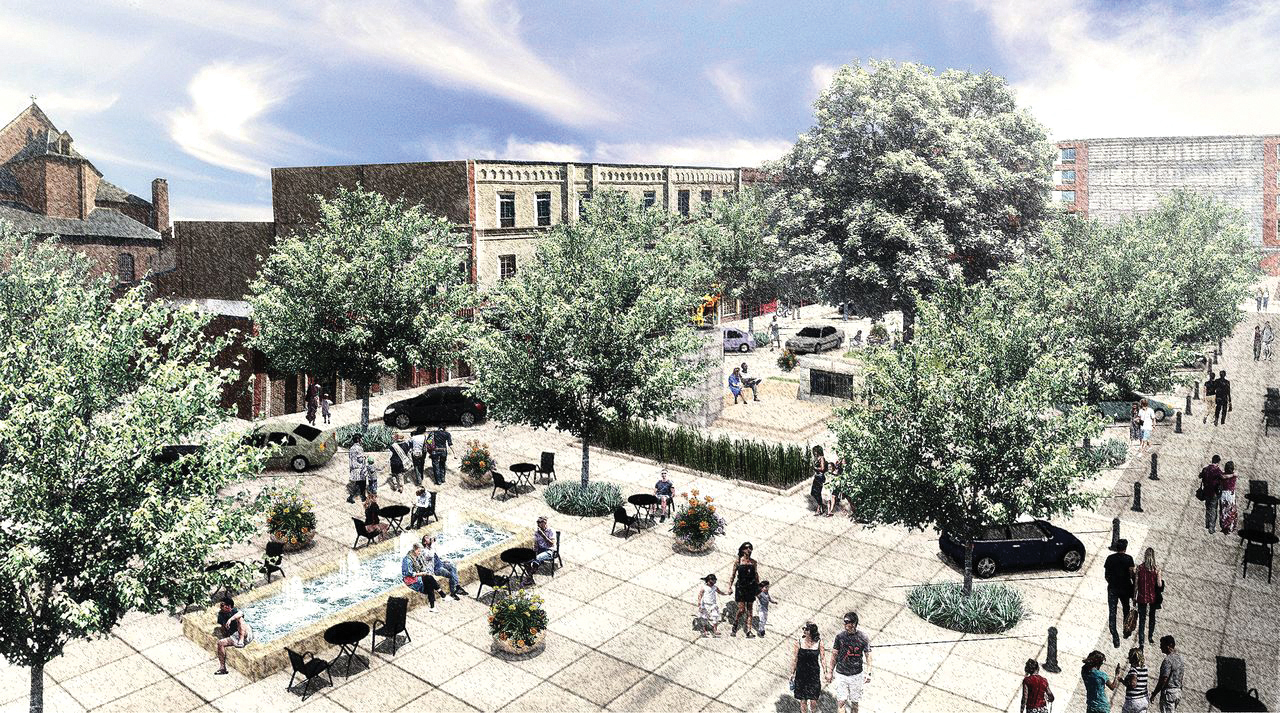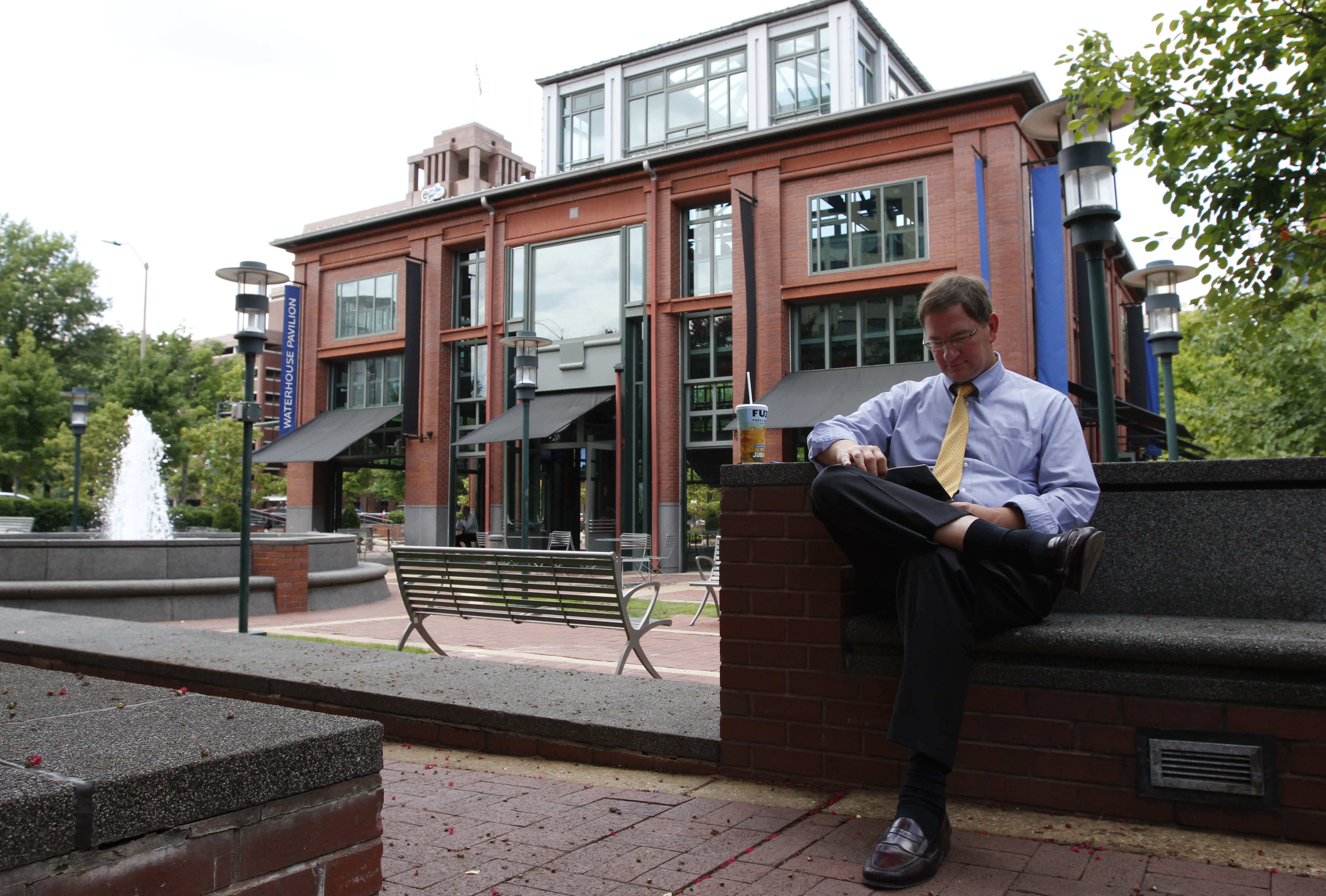The divide between Miller Plaza, the red-brick courtyard and attached pavilion in the core of Chattanooga's city center, and Miller Park is five lanes of traffic on M.L. King Boulevard.
But for some it might as well be worlds apart.
Men in suits, attorneys, judges and businesswomen cut through Miller Plaza's bricked sidewalks on their way to meetings, eat lunch in the courtyard or relax in the adjacent restaurants. In the park south of the boulevard, many homeless people or those sheltered at the nearby high-rise Patten Towers sit on the edges of concrete planters and congregate for hot lunches or dinners provided by charities during certain days of the week.
Yet city planners and officials are eyeing this roughly three-acre plot as a launching point for a plan to transform the city center by getting rid of the physical barriers that divide the plaza and the park.
It's part of a grander vision that River City Co. unveiled earlier this year to connect both Miller Plaza and Park to the nearby Patten Parkway off Georgia Avenue. This estimated two-year plan calls for converting the former, historic Ross Hotel -- which River City bought for $1.2 million with the help of private funding -- into middle-class apartments and then creating a pedestrian-friendly space inside the parkway.
They believe this will provide better access to cyclists and walkers, encourage developers to build more housing downtown and ultimately bring more residents to live in the area.
Mayor Andy Berke's capital budget this year includes $2.8 million to revamp Miller Park and the adjacent block-long section of M.L. King Boulevard.
The city support won't stop there. River City Co. also is asking the City Council to vote this week to restart a previous payment-in-lieu-of-taxes (PILOT) agreement for developers who build multifamily rental housing downtown.
To qualify, developers would have to build within a designated area downtown and offer at least 20 percent of their units at the affordable rate the city has designated -- renting for less than $775 a month to people making less than $39,900 a year.
In return, they would receive certain breaks in their city and county property taxes for a time, similar to PILOT agreements in place for many local industries.
River City President Kim White said one of the downtown development organization's goals is to bring in more business and encourage more downtown housing. But she said people consistently say they first want to see public spaces redeveloped to become more practical and connected.
"[Miller Park] is the main corridor for the city; you come right to that area and it's a really important corner to get activated and utilized in a different way. Or utilized, period," White said.
Miller Park and Patten Parkway potentially could become an economic driver like the Riverwalk, White said, but the current space is outdated and woefully underused.
The manager of Cadence Coffee understands the need.
About a month ago, the coffee shop moved from Patten Parkway to the corner of Seventh and Cherry streets near the Hamilton County Courthouse. The Patten Parkway location wasn't drawing new customers or tourists because they didn't realize the shop existed, manager Molly Williams said.
These days the shop, with a banner high above the street, draws about 20 new customers even on Mondays, typically the slowest day of the week, Williams said. She believes that's because people walking by from the area businesses and firms notice them and stop in.
•••
Chattanooga officials see a revamped Miller Park as the first step in the effort to revitalize the city's core.
Donna Williams, economic and community development director, said the project can only be successful if physical barriers between the park and plaza disappear. She noted that's what happens at the Friday Nightfall concerts, when M.L. King is closed off and the crowd occupies the space.
"The new park should reflect the way Chattanooga is now," she said. "The fact that there are businesses, small and large, restaurants and retail downtown, the fact that there are a lot of people living downtown. The fact that we're pedestrian- and bike-friendly."
The plan developed by River City suggests raising M.L.King Boulevard to the level of the park and plaza so the two places physically connect, but won't call for closing off the street. Then the 55,000 square feet of Miller Park would be completely redesigned.
Plans call for removing the enormous rectangular fountain that flows down into a pool, leveling the site and planting grass. The vision is similar to a smaller Coolidge Park and would encourage people to use the park in the same way, officials say. A smaller fountain is an option.
The 10th Street side of the park could hold a building -- perhaps a ground-floor restaurant that flows out into the park with housing on the upper floors, White said.
All these ideas are on the table, but the plan could change. City officials say the goal is to improve access for people of different demographics.
M.L. King neighborhood leaders say any plan that draws more people to live and do business nearby should eventually benefit residents who already live downtown.
Greater residential density could encourage developers to build service businesses such as a grocery store, dry cleaner or a drugstore within the M.L.King Boulevard vicinity, said Merri Mai Williamson, spokeswoman for the Martin Luther King Neighborhood Association.
Yet Paul Hattendorf, a homeless man who often spends time in Miller Park, asks where he and people like him will go if the park is redesigned.
"It's a blessing to us," he said.
Contact staff writer Joy Lukachick at jlukachick@timesfreepress.com or 423-757-6659.


